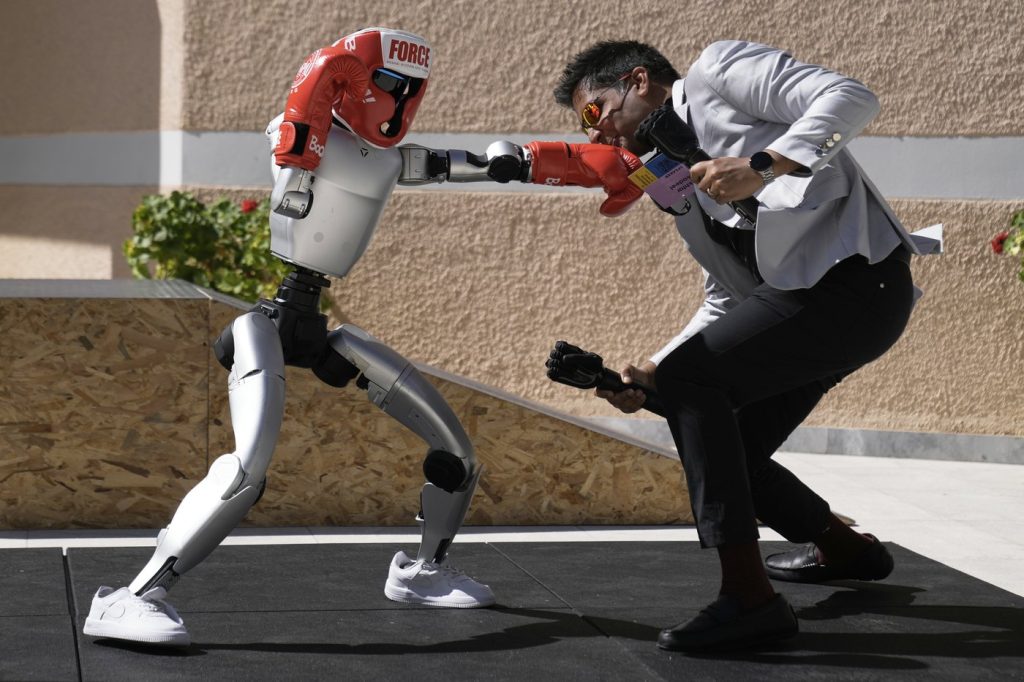ANCIENT OLYMPIA, Greece (AP) A unique event unfolded at the birthplace of the Olympic Games as robots showcased their abilities by participating in soccer matches, demonstrating shadow-boxing skills, and even attempting archery. This captivating display of technology drew the attention of children and onlookers, while experts engaged in discussions regarding the pressing question of when robots will be capable of performing household chores such as tidying closets and washing dishes.
Minas Liarokapis, a Greek academic and startup founder, highlighted a prevailing belief within the robotics community that humanoid robots will first venture into outer space before being entrusted with domestic tasks. He referred to homes as the "final frontier" for these advanced machines. At the International Humanoid Olympiad, which took place over four days in Ancient Olympia, Liarokapis emphasized the expectations surrounding humanoid robots, asserting that it could take over a decade for them to execute household tasks with the necessary dexterity.
The rapid advancement of artificial intelligence (AI), exemplified by developments like ChatGPT, starkly contrasts with the more gradual progress of humanoid robots. According to a recent article in the journal Science Robotics, human-like robots are approximately 100,000 years behind AI when it comes to learning from data due to a significant lack of training material. This is largely because the complexities of real-world actions are much more challenging to record and analyze compared to easily accessible digital data.
To bridge this gap, Ken Goldberg, a professor at the University of California, Berkeley, advocated for a shift away from simulations towards combining traditional engineering methods with real-world training. He suggested this approach could enable robots to collect valuable data while performing practical tasks such as driving taxis or sorting packages, thereby enhancing their learning capabilities.
Luis Sentis, a professor at The University of Texas at Austin, echoed the need for collaboration among researchers, data companies, and major manufacturers to spur the development of humanoid robots. He noted that this collaboration is already drawing significant investment and accelerating progress in the field. During the Olympiad, participants showcased their innovative ideas, including Aadeel Akhtar, CEO of Psyonic, whose bionic hand with sensory feedback aims to bridge the gap between human and robot technology.
Akhtar highlighted the potential of using data from prosthetic hands to advance robot development. Meanwhile, Hon Weng Chong, CEO of Cortical Labs, introduced the concept of a biological computer that utilizes real brain cells on a chip, which could enable robots to learn and adapt more like humans.
The organizers of the Olympiad aimed to establish a foundation for annual competitions that would offer an honest assessment of advancements in humanoid robotics. Event organizers restricted competitions to activities that humanoid robots could reasonably undertake, explaining that more complex events, like discus or javelin throws, were not feasible due to technological limitations.
While Chinese companies actively presented their robotics at public showcases, U.S. participants had a more reserved presence. However, notable exceptions such as Elon Musk's unveiling of Tesla's Optimus robot prototype and Boston Dynamics’ performance on "America's Got Talent" highlighted the evolving landscape of robotics, despite challenges like machine malfunctions during performances demonstrating the hurdles these technologies still face.
As the International Humanoid Olympiad concluded, it became evident that the journey to create fully functional humanoid robots capable of seamlessly integrating into daily life remains a long-term endeavor, marked by both challenges and exciting innovations.











